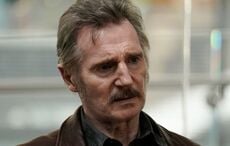Many don't even know his real name but they'll know his brilliants works - from "Dirty Old Town" to "The First Time I Saw Your Face" he is a towering cultural figure in Irish folk and Celtic music.
I was reminded of his influence recently when playing three of his songs on my Celtic Crush/SiriusXM Radio show.
An avowed Marxist he was once considered too dangerous to be allowed into the US, yet he changed the way we listen to music. Born James Miller in 1915, you might know him better as Ewan MacColl.
He was such a towering cultural figure in my youth it never occurred to me that he didn’t hail from the Highlands, in Scotland His parents were indeed Scottish, but Jimmy Miller was born in Salford, part of Greater Manchester.
You probably never heard of the joint, but you’ve hummed along to Millar’s hymn to its industrial dourness - Dirty Old Town.
Millar couldn’t wait to get out of there. He quit school at 14, was organizing on the streets at 15, began his own theatre company at 16, while the British Secret Service opened their first file on him at 17.
Eventually he would shed his given name too. Ewan MacColl had a better ring for a man intent on changing the world.
He had plenty to revolt against - of four children born to his blacklisted ironworker father and charwoman mother, he was the only survivor. He grew up in a house throbbing with political songs, radical dogma, and a desire for universal revolution.
Read more: Scenes of Ireland's emigration - the unforgiving land of Eamon de Valera
A voracious reader and self-educated man, he greatly resented the fact that people of his class were rarely granted entry to the halls of academia, much less the corridors of political power.
Through his travels with his theater company he came to understand that Britain’s old rural way of life was fast disappearing; and so, he set out to record the songs and stories of the poor and dispossessed.
He presented a series of programs on BBC Radio and for the first time many “common folk” heard their accents, vocal mannerisms, and traditions broadcast on a medium that had been the exclusive preserve of the upper classes.
This was to open the door for “regional” people like Brendan Behan, Michael Caine, and The Beatles, all of whom would have been considered figures of fun in earlier decades.
MacColl was a hard, flinty man whose extreme left-wing views barely softened with time.
He could be intolerant and though almost single-handedly responsible for the British folk revival of the 1950s and 60s, he drew up strict rules for what songs could be sung in his folk club and how the performers should dress and present themselves.
He cared little for public opinion and caused grave scandal by leaving his second wife while in his 40s to marry Peggy Seeger, Pete’s 21-year old half-sister. Still he wrote one of the great love songs for her, First Time Ever I Saw Your Face, and their union lasted until his death.
I hear his influence often especially in Celtic music for he was a strict taskmaster to Luke Kelly of The Dubliners who apprenticed at his school for folksingers.
MacColl’s credo was to dig deep and find the inner core of a song, then sing it from the soul without any kind of ornamentation. He took this to rather absurd lengths with women for he frowned on the use of make up during performance.
The Pogues would have appalled him and yet Shane McGowan’s delivery is vintage MacColl courtesy of his adoption of Luke Kelly’s soulful, stringent technique. Then again, one of Shane's best vocals is on MacColl's Dirty Old Town.
I once saw MacColl at Folk City in Greenwich Village. Finally admitted into the US, he dominated the stage – and yet there was a sadness about him. It was during the age of Reagan and it was obvious that time had passed the old Marxist by – his revolution would never come.
Oddly enough, the sadness humanized him and as I shook his hand after the gig I was never less than aware that the man who had written Dirty Old Town, The Traveling People, School Day’s Over, and a hundred other great songs, had indeed changed the way we listen to music.
I told him that Turner & Kirwan of Wexford had recorded a heavily synthesized version of Traveling People. With a glint in his eye he said, “I’ve heard of it.”
Choosing discretion over valor, I did not tell him I’d worn mascara many times while performing it.
Read more: Poor but unbowed, Sean O'Casey left priceless treasure
This article was submitted to the IrishCentral contributors network by a member of the global Irish community. To become an IrishCentral contributor click here.




Comments